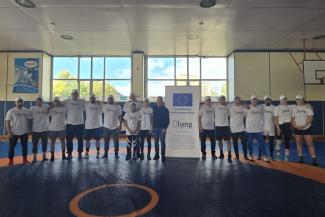Bulgaria hosts OLYMP to increase media literacy
Wednesday, October 15, 2025 - 09:49 By United World Wrestling Press

BULGARIA (October 15) -- Bulgaria hosted a seminar on the OLYMP project, funded by the European Union's Citizens, Equality, Rights and Values (CERV) Programme, at Diana National Wrestling Hall on October 9. The project aims to improve the media literacy of athletes, coaches, and sports managers.
The seminar was led by Georgi BANOV, one of the doyens of Bulgarian sports journalism, who has covered 14 Olympic Games in winter and summer sports, as well as a number of world and European Championships in wrestling, weightlifting, athletics, biathlon, and more.
The seminar was organized for the athletes of the national wrestling teams. The event was hosted by Belcho GORANOV, Chairman of the Ethics and Legal Commission of the United World Wrestling (UWW) and project manager on behalf of the Bulgarian Olympic Committee (BOC).
The team emphasized that the seminar is part of a six-month cycle of informal training under the OLYMP project, which covers a total of 110 young athletes. The program includes weekly sessions in small groups focusing on media and information literacy, critical thinking and analytical skills, as well as developing the participants' confidence and ability to defend their positions with reasoned arguments.
The weekly classes will include readings and discussions on biographies, novels, sports magazines, as well as topics related to sports management and economics. Additional informal activities -- meetings with prominent athletes and film screenings -- will be held twice a month, with each event featuring moderated debates and practical challenges for “fact checking” and ethical behavior on social media.
Banov drew the athletes' attention to how to verify the information they receive through social media and other sources, how to recognize fake news, how to search for reliable information, and how to use social networks correctly, avoiding hate speech.
At the end of the media literacy program, a combined (formal and informal) assessment is planned – short tests and case studies, observation of group work, participant portfolios, and satisfaction surveys—to report on the specific results of the training and its impact on the engagement of young athletes in public life.


 A birdseye view from the first coaching course of the year. (Photo: United World Wrestling)
A birdseye view from the first coaching course of the year. (Photo: United World Wrestling)
Share your thoughts.
Comments